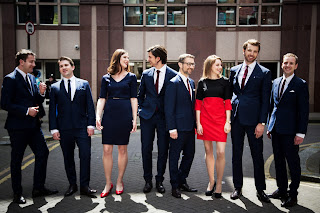 |
| Kian Soltani |
Reviewed by Robert Hugill on Mar 31 2017
Star rating:
Some magical moments in this intriguing exploration of music for violin, cello and choir
 |
| Hugo Ticciati |
 |
| Voces8 |
The first half concluded with Peteris Vasks' Plainscapes which was written in 2002 for Gidon Kremer. The vocal requirements of the choir meant that the eight singers of VOCES8 were expanded to 14. The choir is wordless throughout, starting humming before wordless singing and, at one point, imitating bird-song. The piece opened with the choir's humming as a backdrop to violin and cello interchanges, melodic fragments interspersed with more nebulous, aetherial moments. There was a lovely sense of unhurried time from the string soloists, and at times the interaction of the two made you understand why the Bach inventions had been chosen for earlier in the programme. The magical textures developed into violence and then suddenly stopped, for an amazing array of bird-song imitations from the choir. Fragmentary violin and cello interactions developed into violence again before the opening material returned, to descend into quiet.
It was a mesmerising work, and full of strikingly virtuosic moments though the string writing is far from showy, and both Ticciati and Soltani brought striking intensity to the piece, supported by the fine musicianship of the choir.
After the interval there was more Vasks, this time the 1978 solo cello work Gramata cellam (The Book). In this earlier work there was rather less Baltic-minimalism in Vasks' style, but it was striking nonetheless with a meditative high melody supported by a low drone, when the material dropped an octave the cellist quietly added his own voice to create striking new timbre.
VOCES8 (back to eight singers), then sang the first of The Prayers of St Augustine by Alexander Levine (born 1955) which the ensemble had commissioned for its first tour of Russia. A vigorous piece, with some neo-medievalism in the harmonies but very modern in spirit, then suddenly time was suspended with a lovely soprano solo floating over the top. We went straight into an improvisation from Hugo Ticciati, vibrant and vigorous, with varied textures and moments of contemplation. The vocal ensemble completed the sequence with an intimate account of Arvo Pärt's Nunc Dimittis the eight voices making the placement of notes sound effortless (which it certainly is not).. I have to confess that I really prefer more vocal weight from a larger group in this work, but VOCES8 created some really magical textures and I was very impressed with the two sopranos with their lovely fine-grained tone, never dominating the blend despite the high altitude of the parts.
The rubric at the front of the vocal score of John Tavener's Svyati asks for significant spacing between cellist and choir (when we last performed it with London Concord Singers we had cellist, Corinne Morris, at the opposite end of the nave). Such placement is difficult at Kings Place so Kian Soltani was stage centre with the choir (expanded back to 14, though one was conducting) in the balcony above. With its multiple vocal parts, at most SSSAATTTBBBB, including a low bass drone, the choral contribution from expanded VOCES8 was still very much one to a part and had their trademark attention to detail and fine vocal placement. The first big choral 'Svyati' was simply spine-tingling, not from choral weight but thanks to the beautiful placement of voices. Kian Soltani's keening solo cello had something rather oriental about it, played with a very fine sound quality, intense and expressive, and his final three artificial harmonics were simply stunning. The whole had a remarkably concentrated intensity about it.
Elsewhere on this blog:
- Engaging rarities: Handel's Alceste and Boyce's Solomon - concert review
- A glimpse of work in progress: The National Opera Studio at Rhinegold Live - concert review
- Style & poise: Harry Christophers & the Sixteen in Poulenc - CD review
- Mr Handel's Scholars: London Handel Festival gala - concert review
- Angry Mozart & Haydn: City of London Choir & RPO - Concert review
- Sheer enthusiasm keeps the fizz in this glass: Opera Integra in Die Fledermaus - Opera review
- An exploration of 18th century music & dance: London Handel Players, Academy Baroque Ensemble, Mary Collins, Steven Player, Rachel Brown, Adrian Butterfield, Laurence Cummings - concert review
- Purcell from New York: John Scott and the St Thomas Choir of Men and Boys - CD review
- Music in our time: Nine contemporary composers including Adam Gorb and Paul Patterson - Concert review
- Rediscovering Mendelssohn: Liza Ferschtman on her renewed relationship with the violin concerto - Interview
- Home











No comments:
Post a Comment